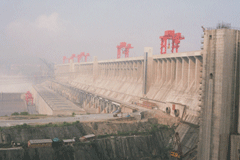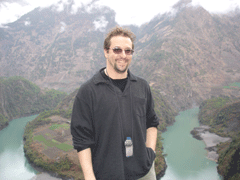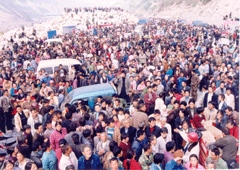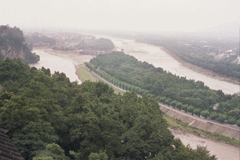China’s Plans for Dams on Shaky Ground
Air Date: Week of May 23, 2008

Political scientist Andrew Mertha thinks dams damaged in the Wenchuan earthquake might shake up China's plans to triple its hydro-electric production by 2020. Host Bruce Gellerman talks with Mertha, author of the recent book “China’s Water Warriors,” about China's hydropower ambitions and the growing grassroots opposition to large-scale dam projects in the country.
Transcript
GELLERMAN: It’s Living on Earth – I’m Bruce Gellerman. The earthquake that struck central China killed tens of thousands of people, left millions homeless, and caused billions in destruction. Among the structures damaged are nearly 400 dams in Sichuan province. Soldiers have been patching cracks in the dam walls and engineers releasing reservoirs of water to prevent catastrophic collapse. Half the world’s large dams are in China, and the country’s banking on hydropower to fuel its energy future: there are plans to triple generating capacity in the next 12 years.
But in light of the earthquake, one expert says China’s likely to rethink those plans as opposition to hydropower dams grows. Andrew Mertha is an assistant professor of political science at Washington University in St. Louis, and author of the book, “China’s Water Warriors: Citizen Action and Policy Change.”

Andrew Mertha at the first bend of the Nu River in southwestern China, where a large-scale dam project was suspended in 2004 amid controversy. (Courtesy of Andrew Mertha)
GELLERMAN: Why would a political scientist be interested in Chinese dams?
MERTHA: Because dams are an insight into how the political system operates, both in terms of territories, local governments, as well as various functional bureaucracies – they tend to fight over the construction of these dams. So in order to get anything built, politics are at the center of it. And China, as you know, has been able to get by so far with its impressive coal reserves. But because of pollution hindering economic development, and because of competition with the United States and other countries, they really need to focus on renewable sources of energy that can be produced within China itself.
GELLERMAN: Sichuan Province, where there was this terrible earthquake, seems to be the focal point of a lot of the hydropower in China, am I right?

The Three Gorges Dam on the Yangtze River is 350 miles east of the epicenter of the Wenchuan earthquake. It will be the largest hydropower dam in the world when construction is finished. (Courtesy of Andrew Mertha)
GELLERMAN: Mao Zedong figures in one of the three case studies in your book. He wants to swim in an area, and he’s told he can’t. That leads the leadership of China to want to build a dam there.
MERTHA: Yea. Mao was an avid swimmer – and maybe swimming is not the right word. He liked to float on his back a lot. And he would take swims at significant times to underscore a political message. In this case, it seems that he just wanted to go for a dip in the Min River when he was visiting Sichuan in the late ‘50’s, and because the river itself was somewhat difficult to navigate, he was told finally that he was unable to do so.
GELLERMAN: And then the bureaucrats turn around and say, well we gotta let the Chairman swim the river, so let’s build a dam!

Around 100,000 people turned out in 2004 to protest construction of the Pubugou Dam in Sichuan Province. The Chinese government delayed construction for a year and now expects to finish the 3,330 MW dam by 2010. (Courtesy of Andrew Mertha)
GELLERMAN: So that was the key? That it was a grassroots opposition in China?
MERTHA: It’s difficult to believe. But in China there are anywhere up to two million non-governmental organizations.
GELLERMAN: We in the West tend to look at China politically as a monolith.
MERTHA: Well, it’s anything but. When the opposition is successful, they’re successful because they’re able to frame the issue in a certain way. In the case of Dujiangyan in Sichuan, along the Min River, they’re successful because Dujiangyan is also the home of a more than 2000 year-old irrigation project that is still functioning, still in place, and is something that resonates with Chinese historical identity. So they were able to change the focus of debate from economic development to the preservation of cultural heritage.

The 2,300-year-old Dujiangyan Irrigation System is praised for controlling floods and supporting agriculture while not obstructing the Min River’s natural flow. (Courtesy of Andrew Mertha)
MERTHA: Well, the fear is always there because hydropower stations are best built in areas that are also earthquake-prone. And of course the water filling up the reservoir provides weight on the earth that contributes to instability. But these are things that were discussed for sure, but they were not really useful to the opposition as ammunition in the discourse over whether or not to build these stations.
GELLERMAN: Hydropower is really going to be one of the primary sources of energy for China of the future. What happens if the protest movement against these dams is successful and they don’t have the energy to fuel their future?
MERTHA: Well, in the short to medium term, what that would mean is increased reliance on traditional sources of energy: coal, for example, non-renewable fossil fuels, for example, and in the latter case that would mean competition with the United States, with the EU, with Japan, and the increase of oil prices even more.
GELLERMAN: Well, Professor Mertha, thank you very much.
MERTHA: It’s been my pleasure.
GELLERMAN: Political scientist Andrew Mertha’s book is “China’s Water Warriors: Citizen Action and Policy Change.”
Links
Living on Earth wants to hear from you!
Living on Earth
62 Calef Highway, Suite 212
Lee, NH 03861
Telephone: 617-287-4121
E-mail: comments@loe.org
Newsletter [Click here]
Donate to Living on Earth!
Living on Earth is an independent media program and relies entirely on contributions from listeners and institutions supporting public service. Please donate now to preserve an independent environmental voice.
NewsletterLiving on Earth offers a weekly delivery of the show's rundown to your mailbox. Sign up for our newsletter today!
 Sailors For The Sea: Be the change you want to sea.
Sailors For The Sea: Be the change you want to sea.
 The Grantham Foundation for the Protection of the Environment: Committed to protecting and improving the health of the global environment.
The Grantham Foundation for the Protection of the Environment: Committed to protecting and improving the health of the global environment.
 Contribute to Living on Earth and receive, as our gift to you, an archival print of one of Mark Seth Lender's extraordinary wildlife photographs. Follow the link to see Mark's current collection of photographs.
Contribute to Living on Earth and receive, as our gift to you, an archival print of one of Mark Seth Lender's extraordinary wildlife photographs. Follow the link to see Mark's current collection of photographs.
 Buy a signed copy of Mark Seth Lender's book Smeagull the Seagull & support Living on Earth
Buy a signed copy of Mark Seth Lender's book Smeagull the Seagull & support Living on Earth

